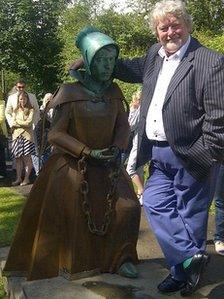Statue of Pendle Witch Alice Nutter unveiled
- Published

The statue was the idea of Pendle councillor James Starkie
A statue to commemorate one of the Pendle Witches has been unveiled in her home village of Roughlee.
Alice Nutter was one of the group of people tried for murder after being accused of using witchcraft 400 years ago.
The two-day trials in 1612 led to 10 people being hanged at Gallows Hill in Lancaster, after being found guilty of causing death or harm.
"It's not your stereotypical hooked nose, warts and ugly countenance," Sarah Lee, of Pendle Council, said.
"She was a dignified person and the statue reflects that."
The statue was designed by David Palmer who lives in the village and unveiled by another of Roughlee's residents, Bobby Elliott from the 1960s pop group The Hollies.
Its creation was the idea of Pendle councillor James Starkie, whose interest in the story dates back to his time as an art student in Lancaster.
Alice Nutter was unusual among the accused as she was the wealthy widow of a farmer.
She kept silent throughout her trial except to enter a plea of not guilty to the murder of Henry Mitton by witchcraft.
She was later hanged after a statement by a nine-year-old witness, <link> <firstCreated>2011-08-17T10:06:27+00:00</firstCreated> <lastUpdated>2011-08-17T10:06:27+00:00</lastUpdated> <caption>Jennet Device</caption> <url href="http://www.bbc.co.uk/news/magazine-14490790" platform="highweb"/> <url href="http://www.bbc.co.uk/news/mobile/magazine-14490790" platform="enhancedmobile"/> </link> , stated she had been present at witches' coven meeting at Malkin Tower meeting on Good Friday, 1612.
- Published16 March 2012
- Published8 December 2011
- Published17 August 2011